Social Work News
Class of 2025 Social Work Awards
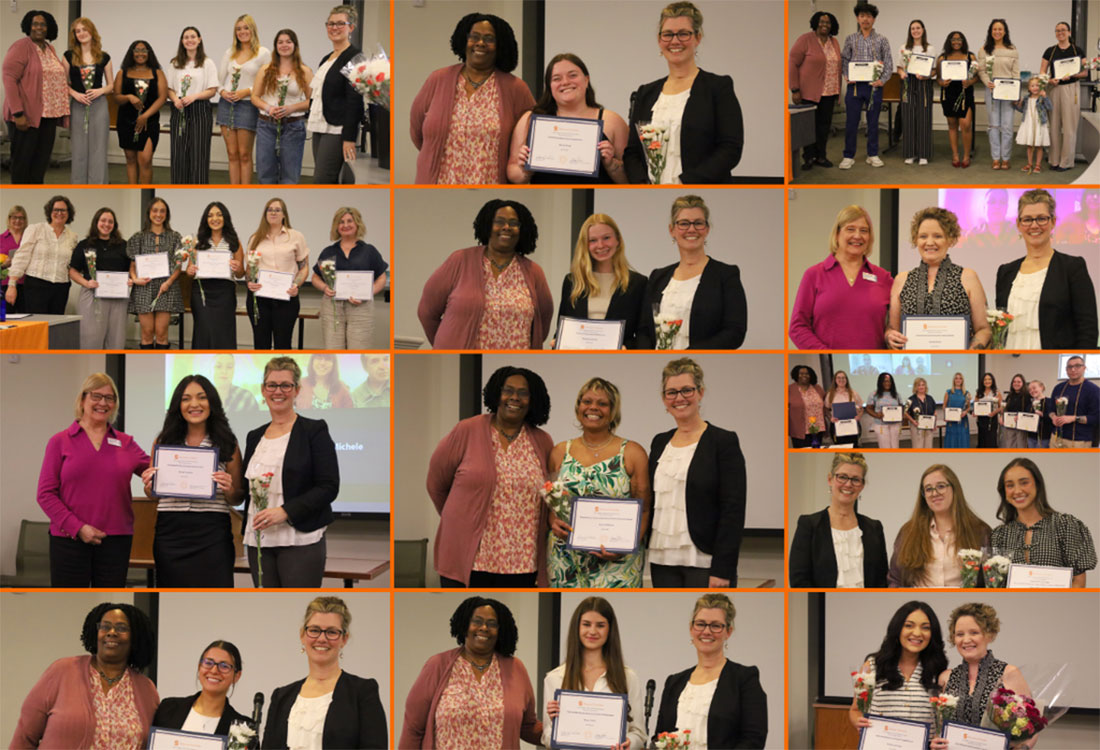
The School of Social Work in the Falk College of Sport and Human Dynamics recently honored the following undergraduate and graduate students with 2025 department awards at its annual awards and celebration event:
Keith Anthony Alford Diversity and Inclusion Award
This award is named in honor of Keith Alford, Ph.D., former Syracuse University Chief Diversity and Inclusion Officer (2018-2021), M.S.W. Program Director (2016-2018), B.S.S.W. Program Director (2008-2012), and Director of the School of Social Work (2016-2019).
Recipient: Naomi Brogden (Undergraduate)
From Naomi: “During my final year at Syracuse University, I had the opportunity to intern at Onondaga Community College’s Counseling & Community Care Hub, where I supported students as a Case Management intern. That experience deepened my passion for working with students, especially those with developmental disabilities who are too often left without the support they deserve. Following graduation, I’ll be attending Rutgers University for its Advanced Standing M.S.W. program and where I plan to continue advocating for more inclusive, holistic support systems in schools.”
Recipient: Nicole Corrente (Graduate)
From Nicole: “One of my proudest accomplishments to date has been leading mission teams to Choluteca, Honduras, in collaboration with local organizations dedicated to feeding, housing and supporting some of the city’s most vulnerable populations. Most recently, I completed my final field placement with Catholic Charities of Onondaga County, working within the Services for Afghan Survivors Impacted by Combat program to provide mental health support services for refugees. Looking ahead, I hope to apply my social work skills in international settings, serving impoverished and marginalized communities around the world.”
Elizabeth Brown Thoreck Student Achievement Award
This award is presented to a non-traditional-aged undergraduate student who is in good academic standing in the academic arena and the field placement setting.
Recipient: Kiana Williams (Undergraduate)
From Kiana: “I am a 44-year-old mom to my wonderful 19-year-old son Kairo, who is a freshman at Syracuse University. I work full-time as the case manager at a runaway and homeless teen shelter, where I have worked for almost three years. My field placement is Family Place, which provides clinical counseling and coached visitation for parents working to get their children back from kinship/foster placement. While initially jarring, this field placement was a blessing because it helped me figure out what I wanted to do in the future. Following graduation, I’ll be attending the Syracuse University School of Social Work Advanced Standing M.S.W. program. I want to help older teens and young adults meet their basic needs, tend to their mental health needs, and educate them on their history and the power of Black, Latino, Asian, Indigenous, and LGBTQIA+ communities.”
Bachelor of Science in Social Work Award
This award is given to a Social Work graduating senior in good academic standing who is involved in social work, community, and Syracuse University activities.
Recipient: Madeline Heintz (Undergraduate)
From Madeline: “I am graduating with a dual major in Social Work and Psychology and I compete for Syracuse’s track and cross country team. I completed my practicum field placement and work with REACH CNY, a perinatal services nonprofit that provides Early Head Start home visiting and supervised visitation, and I am involved with Social Workers United. Next year, I’m pursuing a certificate in Health Services Administration and Policy and aspire to earn my M.S.W. in the future.”
Scholastic Excellence Award
This award is given to the student with the highest cumulative GPA among graduating seniors.
Recipient: Alexis Maag (Undergraduate)
From Alexis: “I am currently a senior in the Social Work undergraduate program, with my current field placement at Van Duyn Center for Rehabilitation and Nursing. I plan to attend the Syracuse University Advanced Standing M.S.W. program starting this summer. My hope for my future graduate placement is to gain experience regarding administrative work and help provide needed resources and support to the community.”
Catherine Mary Esposito Achievement Award
This award is given to an outstanding undergraduate student who has demonstrated a commitment to clients with developmental disabilities and is in good academic standing, but more importantly has had success with people who have developmental disabilities.
Recipient: Maya Carter (Undergraduate)
From Maya: “As an undergraduate, I had the opportunity to serve as a home visitor and educator with the Early Head Start program at REACH CNY. Working to support school readiness while strengthening parent-child relationships with families from all walks of life has deepened my passion for the social work profession and reinforced my commitment to community empowerment. This fall, I will begin the Advanced Standing M.S.W. program at Syracuse University and start my journey at the VA, where I will focus on housing support for veterans in the Syracuse area.”
Recipient: Erin Huber (Graduate)
From Erin: “I am a recent graduate, and my field placement was at Alliance of Disability Advocates in Raleigh, North Carolina. ADA is a center for independent living and non-profit organization that offers five core services to disabled individuals in the communities it serves, including independent living skills training, peer support, advocacy, transition support, and information and referrals. I am currently employed full-time with ADA and work with people of all disabilities, including developmental disabilities. I also have a developmental disability (ADHD) and was not officially diagnosed until my final semester of graduate school. I am in the process of receiving my work incentive practitioner credential through Cornell University’s WIP training program. I am grateful for this award and will continue to advocate for the disability community in the future.”
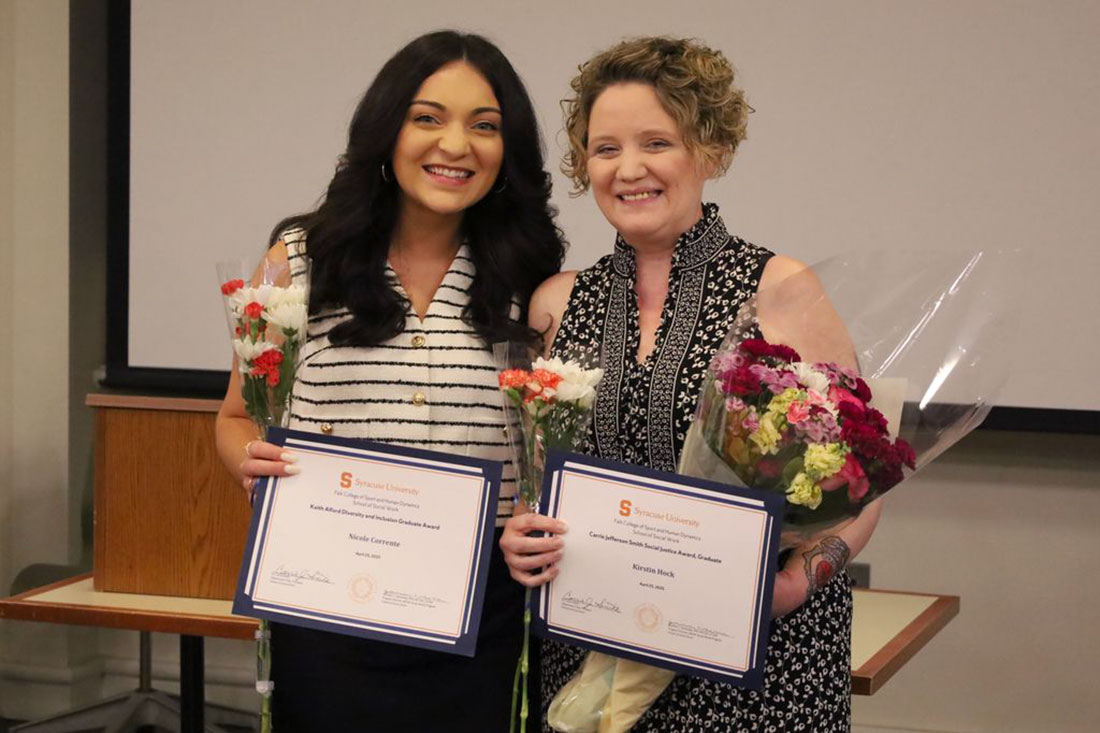
Rhonda B. Cohen Prize in Gerontology Award
This award is named in honor of Rhonda B. Cohen, who graduated from the M.S.W. program in 1983 and was an advocate for the elderly before passing away at a young age. The award criteria include cumulative GPA, community service, and an interest in working with older adults.
Recipient: Natalie Foley (Undergraduate)
From Natalie: “I am a Social Work and Psychology undergraduate major with a minor in Human Development and Family Science. I am currently completing my second field placement at Central Park Rehabilitation and Nursing Center. My first field placement was at Huntington Family Center. These opportunities provided me with the experience I needed to shape my academic next steps and future career, and I am excited to attend New York University’s Advanced Standing M.S.W. program in the fall.”
Mary Pat Cotter Remembrance Award 2nd- Year Graduate Student
This award is given to a graduate Social Work student for contributions to Substance abuse and HIV/AIDS.
Recipient: Samuel Castleberry (Graduate)
About Sam: Sam works full-time as a CASAC at Helio Health, where he supervises the Mobile Crisis team and the Syracuse Crisis Intervention and Prevention Program (SCIPP), which focuses on SUD assessment, connecting individuals to detox or inpatient services, and following-up on every 911-reported overdose in the City of Syracuse within 24 hours. Sam recently completed his internship at Upstate’s Psychiatry High Risk Program, which specifically focuses on individuals at high risk of suicide, many of whom struggle with SUD. Sam identifies as a person in recovery from SUD and knows from first-hand experience that recovery is not only possible, but transformative.”
Kenneth J. Marfilius Veteran or Military Connected Student Award
This award is given to a graduate student in good academic standing who is a military veteran. The award is based on GPA and community and Syracuse University contributions.
Recipient: Jason ODay (Graduate)
About Jason: Jason completed his field placement at TrueNorth Wellness Services in McConnellsburg, Pennsylvania, where he gained invaluable experience and was welcomed as part of the family. He is currently employed at Echo Harbor Mental Health, a veteran-led business he is building with his fellow Marine and M.S.W. classmate, Sam Coyl. Both will graduate in May 2025 and together they are committed to expanding access to mental health care, raising awareness, and making a lasting impact in the lives of veterans and underserved communities.”
Virginia Insley Award
This award is given to an outstanding Social Work M.S.W. Health Care Concentration student who is interested in maternal and child health.
Recipient: Jennifer Wall (Graduate)
About Jennifer: Jennifer is the Co-Founder and Executive Director of Zach’s Bridge, a 1:1 peer support program for advanced and bereaved pediatric cancer parents and caregivers that she started with her husband, Jonathan, after the death of their son Zach in 2021. She also works as a Parent Peer Research Navigator for the COMPRENDO Intervention at the Dana-Farber Cancer Institute and previously served as Bereavement Coordinator at Notre Dame Healthcare in Worcester, Massachusetts, where she completed her social work internship in 2023-2024. Jennifer also holds a Master’s in Healthcare Management from the Heller School at Brandeis University and a bachelor’s degree from Brown University. She intends to continue her work with Zach’s Bridge and Dana Farber after graduation, and is considering starting a small, direct practice focused on grieving parents.
Carrie Jefferson Smith Social Justice Award
This award is given to a student who has demonstrated commitment to social justice, particularly in the area of improving the lives of victims impacted by the continuum of domestic violence.
Recipient: Kirstin Hock (Graduate)
About Kirstin: Kirstin is a dedicated professional in the field of child welfare with nearly a decade of experience. She recently completed her field placement at the Onondaga County Department of Children and Family Services. Alongside her efforts to ensure the safety and well-being of abused and neglected children, she provides advocacy and support for children and families impacted by domestic violence. After graduation, Kirstin plans to continue her career in child welfare as an LMSW, driven by a strong commitment to social justice and systemic change for vulnerable populations.
United for Change
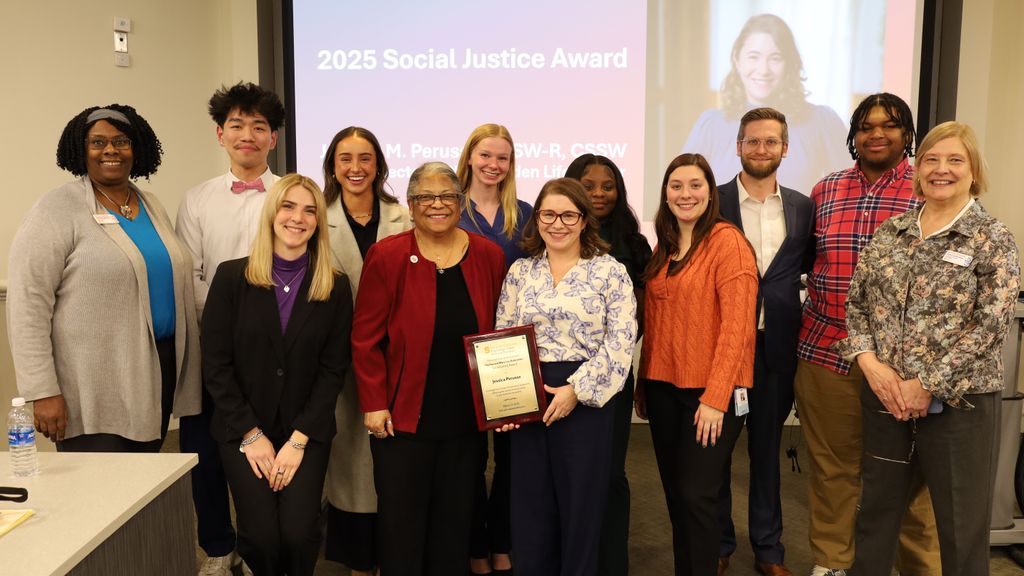
As director of The Camden Life Center in Camden, New York, Jessica Perusse, LCSW-R, CSSW, has several ties to the students and faculty in the School of Social Work in the Falk College of Sport and Human Dynamics.
That connection grew even stronger on March 27, when Perusse received the School of Social Work’s prestigious Social Justice Award. Perusse also served as the keynote speaker of the annual Dan and Mary Lou Rubenstein Social Justice Award program that was held before a standing-room-only audience in Room 200 White Hall in Falk College.
Presented for more than 30 years during National Social Work Month in March, the Rubenstein Social Justice Award is given in honor of the late professor Dan Rubenstein, a former faculty member in the School of Social Work, and his late wife, Mary Lou, a former school social worker. Recipients of this award are role models whose courage and strength inspire others to stand up—and step up—to advocate and be a voice in their local community. The values of social justice are integral to honorees’ daily lives, and their work represents the true spirit of the Rubenstein Social Justice Award.
The theme of this year’s program was “United for Change: Honoring Collective Impact and Collaboration in Rural Communities,” and Perusse’s impact in Camden and collaboration with Syracuse University is second-to-none in Central New York.
“This year’s theme invites us to think deeply about what it means to stand together in solidarity, especially with communities that have too often been overlooked or underserved,” said School of Social Work Chair and Professor Carrie Jefferson Smith.
“Jessica reminds us that collective impact begins with one person saying, ‘Yes, this matters.’ With one person having the courage to care,” Smith added. “She reminds us that justice is not a destination, it is a daily practice.”
The Camden Life Center, a partnership between the Come to the Table Counseling and Center for Family Life and Recovery (CFLR), is a center for multiple agencies to come together and act in their areas of strength for the maximum impact and overall benefit of their community. The primary goal is to inspire hope, provide help, promote wellness, and transform lives with a focus of being “in Camden, of Camden, for Camden.” Camden is located less than an hour’s drive northeast of Syracuse.
During her keynote address, Perusse described the evolution of The Camden Life Center and how she wanted to tailor its services to the needs of the rural community.
“We don’t need mega, multiple agencies providing tons of services,” Perusse said. “We need partnerships with agencies that are willing to understand our rural culture without changing our values and beliefs.
“It wasn’t easy; we had to earn the trust of our residents,” she continued. “It took time, consistency, and showing up time and time again to show that I’m not just a provider, I’m your neighbor.”
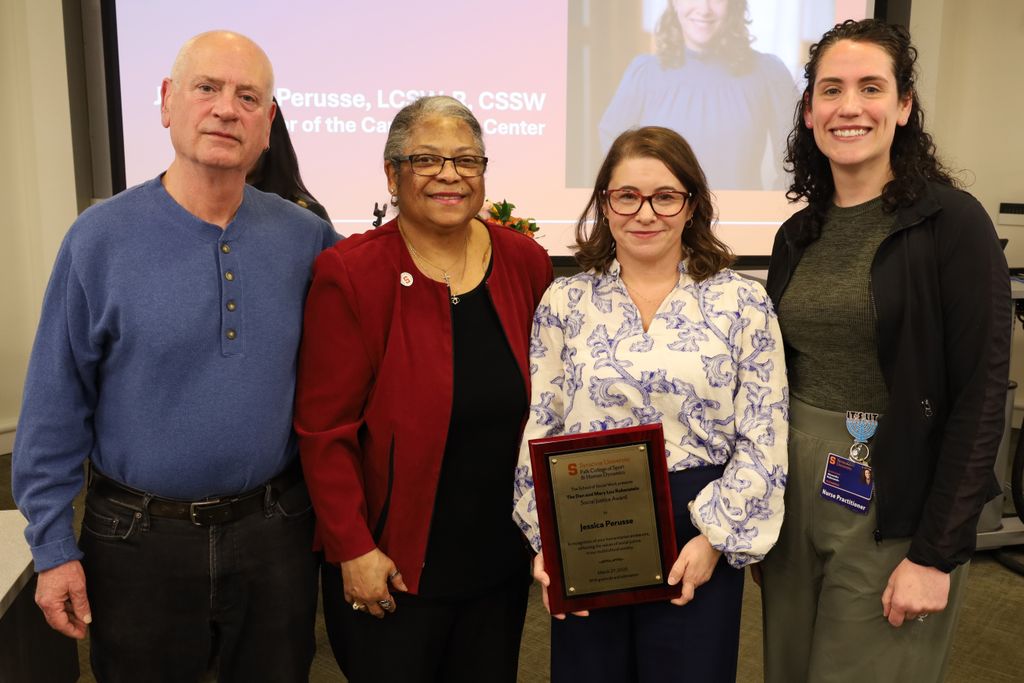
Perusse noted that the national shortage of mental health providers is even worse in rural communities, where “the work can be very lonely.” She said the challenges in Camden were intensified this winter, when 30 feet of snow fell in the area and caused the collapse of several homes and businesses.
“I was struck by the magnitude of destruction in our community, and it hurts my social worker heart to think how we’re going to recover from this,” Perusse said.
Perusse regularly supervises Master of Social Work (M.S.W.) students as interns at The Camden Life Center and plays an integral role in connecting students to research and practice. Perusse and Ken Marfilius, Assistant Dean of Online Education in Falk College and Associate Teaching Professor of Social Work, were colleagues on the Healthcare for Homeless Veterans team in the Syracuse VA Medical Center and that work helped inform ongoing collaborations between Perusse and Syracuse University.
Marfilius, who introduced Perusse at Social Justice Award event, and Assistant Professor of Social Work Xiafei Wang, worked on one grant project with The Camden Life Center and recently started a second one. The first project in 2023-24 involved a $350,000 grant from the CFLR/Community Foundation of Herkimer and Oneida Counties. That project utilized the lens of social determinants of health and trauma-informed behavioral health approaches to identify and address the unmet service needs of rural residents in Camden, aiming to enhance the quality of care provided by The Camden Life Center.
For the current project, which received an $839,000 grant from the Mother Cabrini Health Foundation, Marfilius and Wang are serving as the research team for the Camden Life Center’s launch of the Community Café Initiative. This partnership between CFLR and The Camden Life Center is designed to foster connection, resilience, and well-being for families and individuals in Camden and its surrounding communities.
Perusse said for this latest initiative to be successful, she and her team will need continued support so they can support those in need in Camden.
“If you know a social worker who works in a rural community, check on them and offer support and encouragement and help them be seen,” Perusse said. “Thank you for this time and the attention you brought to this very important theme.”
The Social Justice Award ceremony was moderated by social work graduate students from the Social Workers United student organization. The students who participated in the event included Gideon Casper, Mary Claytor, Madeline Heintz, Taylor Koennecke, and Allan Zheng.
The School of Social Work was founded in 1955 and opened in 1956 after Syracuse University received a major grant from the Rosamond Gifford Charitable Corporation. In 2024, the School of Social Work was ranked by U.S. News and World Report as among the “Best Schools of Social Work” in the country, and its national profile will continue to rise with the start of the prestigious Genovese Scholars Program that was created recently through a $300,000 gift to the school.
The School of Social Work is known for its long history of community impact and outreach, including annual donation drives organized by Social Workers United. On July 1, the School of Social Work will move to Syracuse University’s School of Education to enhance the academic and community impact of the program, grow enrollment, drive research excellence, and strengthen the University’s long-standing commitment to preparing professionals to thrive in human, health and social services.
Voices of Service
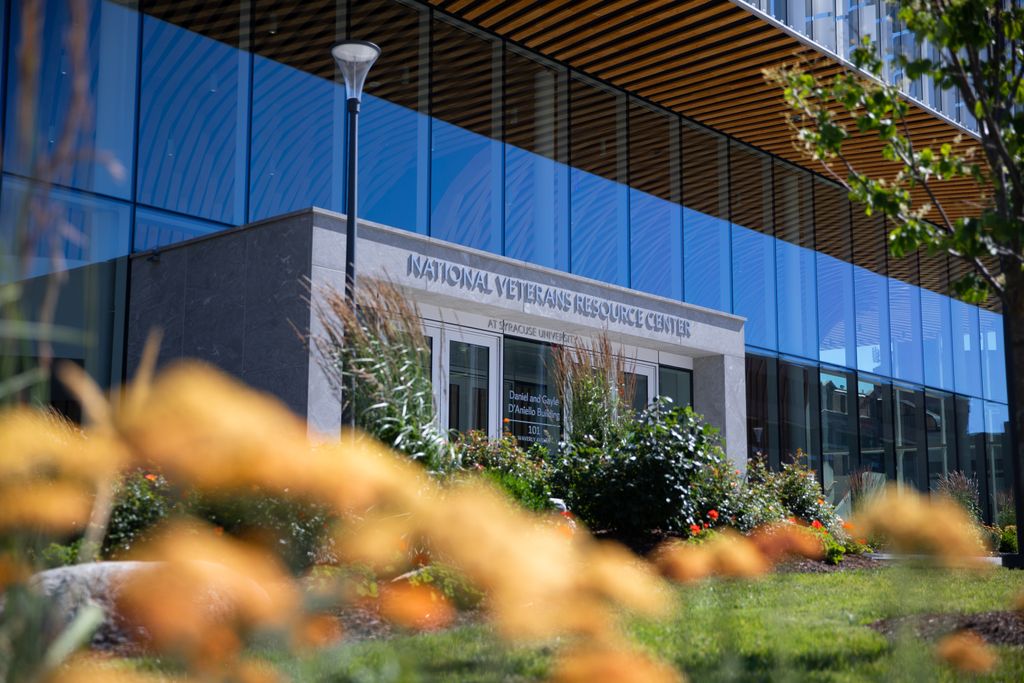
Call for Posters
The Institute for Veterans and Military Families (IVMF) and Academic Affairs invite you to submit poster abstracts for an inaugural event spotlighting diverse and dynamic work related to the interests and needs of veterans and military-connected populations. By showcasing ongoing and planned research projects, curricular innovations, program initiatives, and community engagement, we aim to amplify these efforts and foster new collaborations across our campus and community.
When and Where
- Date: April 10, 2025
- Location: National Veterans Resource Center (Syracuse University)
- Time: 12:30 PM – 3:00 PM
Who Should Submit and Attend?
- Syracuse University students (undergraduate, graduate) and trainees (postdocs)
- Syracuse University faculty and staff
- Community partners and collaborators in the Central New York region
Topics of Interest
We seek posters that highlight completed, planned, or in-progress research, curricular work, or applied services and programming related to the lived experiences, needs, or interests of veterans and/or military-connected families and individuals. We welcome contributions from all disciplines and fields that intersect with veteran and military-connected topics. Relevant topics include, but are not limited to, the following:
- Research Projects and Analyses that are completed, planned, or in-progress
- Curricular or Course-Related Efforts that focus on or integrate veteran- and military-related content
- Programs and Services that benefit or support veterans and/or military-connected populations
- Student Internships or Field Placements involving veteran research, support, outreach, or engagement
Important Dates
- Abstract Submission (250 words): Due by February 24, 2025
- Notification of Acceptance: By March 7, 2025
- Final Digital Poster Email Submission: By April 7, 2025, to Julianna Fitz at jlfitz@syr.edu
Submission Details
- Submit abstracts to Julianna Fitz at jlfitz@syr.edu
- Include: Title (up to 150 characters); Author name(s); Affiliation(s); and Email address(es)
Event Schedule
Requirements, Process, and Questions
- All presentations will be in person and posters must be printed.
- Presenting authors are requested to attend the poster session.
- Presenters are responsible for printing their own posters.
- Posters should be no larger than 30″ x 40″ (portrait or landscape).
- Easels, foam board, and binder clips will be provided.
- Posters will be accepted based on the quality of the abstract and the order received.
- For questions, please contact Jamie Winders at jwinders@syr.edu
Committed to Service
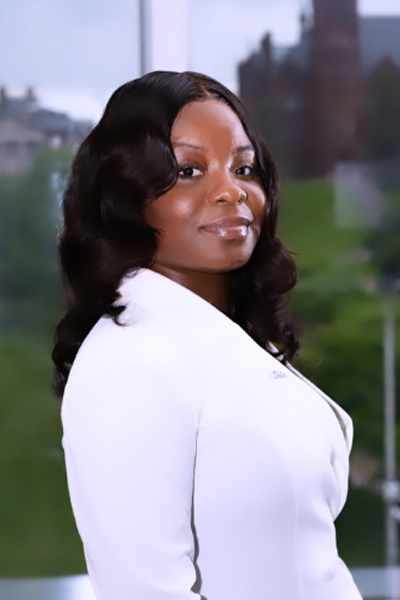
Social Work student Benetta Dousuah G’25 is one of three talented and passionate Pat Tillman Foundation Syracuse University 2024 Tillman Scholars.
The award unites and empowers remarkable military service members, veterans, and spouses as the next generation of public and private sector leaders committed to service beyond self. Dousuah was selected out of nearly 1,600 applicants.
Tillman Scholars are provided with academic scholarships, leadership development opportunities, and access to a supportive national network as they embark on career journeys in the fields of health care, public service, business, STEM, law, the humanities, and education.
The fellowship program honors Pat Tillman, a starting safety for the National Football League’s Arizona Cardinals, who in 2002 put his football career on hold to serve his country with the U.S. Army’s 75th Ranger Regiment in Afghanistan. Tillman’s family and friends established the Pat Tillman Foundation following his death in April 2004.
Syracuse University was invited to become a Pat Tillman Foundation University Partner in 2017. To date, the university has seen 13 students honored as Tillman Scholars.
Dousuah sat down with SU News to discuss why she wanted to become a Tillman Scholar, reflect on the prestigious honor, and share how she will use the scholarship to make a difference in her community.
Benetta Dousuah G’25, U.S. Army
Academic major: Social Work
What drew you to study at Syracuse University?
“I chose Syracuse University because it’s known for being a veteran-friendly school. While transitioning out of the military, I visited and was impressed by how much they support student veterans. The National Veterans Resource Center at the Daniel and Gayle D’Aniello Building showed me how much the school cares about their veteran community.”
Where did your interest and passion for your field of study come from?
“My aim is to challenge and transform the existing stigma surrounding mental health and well-being in the military. My goal is to become a social worker and serve as Sexual Harassment/Assault Response and Prevention (SHARP) representative at a behavioral health clinic on a military installation, particularly regarding sexual assault and harassment. This position will allow me to address significant issues related to mental health and advocate for policy changes within the SHARP program.”
How does it feel to be recognized as a Tillman Scholar?
“It’s an honor to be surrounded by people dedicated to making a difference in our military. My passion is to change how investigations are done in the SHARP program. I am excited to bring this idea to other scholars and see what the future holds.”
What motivated you to apply to be a Tillman Scholar, and why do you think you were selected?
“Pat’s story is incredible. It demonstrates selfless service and leadership, two of the Army’s core values. As a Tillman Scholar, I am honored to carry on Pat Tillman’s legacy. I’m inspired by these exceptional individuals who are making a difference. I was chosen as a Tillman Scholar because of my dedication to making a positive impact. Despite facing a traumatic experience, my goal is to reform the system that failed me, ensuring a safer military for future generations.”
How do you plan to use this scholarship and this experience to make an impact in your community?
“I aim to use the education and experiences from Syracuse University and the Tillman Scholar program to advocate for significant policy changes, specifically to reform the investigative process within the SHARP program.”
Excerpts from a Syracuse University News story by John Boccacino originally published on June 27, 2024.
Providing Support and Services
In recognition of May being Mental Health Awareness Month, the University’s Office of Veteran and Military Affairs (OVMA) is pleased to announce the launch of the OVMA Resiliency Program (ORP) in partnership with Falk College and Hendricks Chapel. The ORP is an innovative wellness program tailored to meet the unique needs of veterans pursuing higher education and aims to enhance the overall well-being of veteran and military-connected students throughout their academic journey.
According to a U.S. Government Accountability Office report earlier this year, almost 70% of student veterans who are patients in Department of Veterans Affairs (VA) hospitals received services for mental health care, compared to just 40% of all other veterans who received mental health care from the VA. Aside from seeking services to address concerns regarding post-traumatic stress disorder, the report shows a rising trend over a six-year period of student veterans seeking out care for depression and anxiety-related disorders more than their non-student veteran peers.
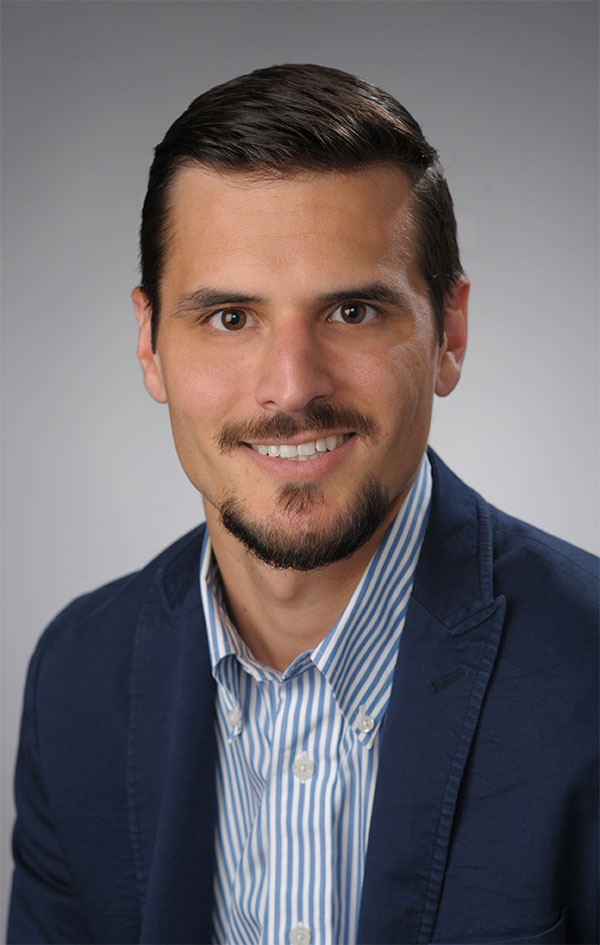
“Aside from being non-traditional students, which brings additional stresses to their academic studies, student-veterans also have unique needs that most colleges and universities are not prepared to handle. There’s a clear need to provide military-connected students with assistance beyond just information on where they may find resources,” says Ken Marfilius ’11, assistant dean of online and distance education and associate teaching professor of social work in the Falk College. “This program will help assist student veterans in not only knowing what resources are available, but also how to navigate the process to receive those services and, sometimes, providing further support to ensure they get the care they need.”
Marfilius, a U.S. Air Force veteran, will become the associate director for the ORP where he will lead two Falk College graduate student interns, Brenic Nam G’25 and Natalie Hawes G’25, as well as leverage his extensive experience in providing mental health care services to the military-connected community to ensure the program’s effectiveness.
Both interns are military-connected students at Syracuse University who are pursuing master’s degrees in social work. Hawes is a veteran spouse as well as the granddaughter of two World War II veterans, and has more than five years of experience in supporting the military-connected community. For Nam, currently a sergeant in the U.S. Army Reserve after spending time on active duty, it’s an opportunity to build upon lessons learned while working at Clear Path for Veterans, a nonprofit veteran’s service organization located in Central New York.
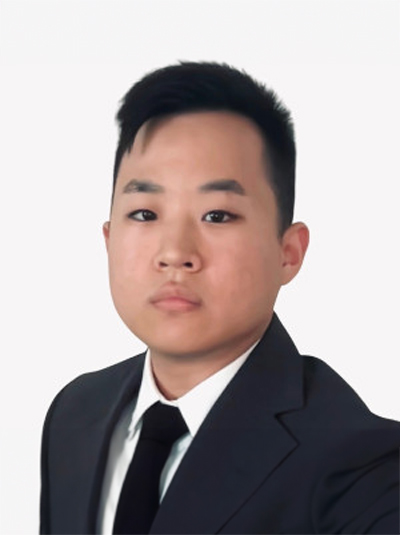
“Veterans and military-connected students undergo significant transitions as they shift from military to civilian life. Through this phase of acculturation, they endure unique challenges that often result in immense stress. A dedicated program like ORP will provide imperative support, empowering these veterans and (military-connected) students to confidently navigate these challenges while pursuing their personal ambitions and reaching their fullest potential,” Nam says.
Hendricks Chapel, alongside the OVMA, will provide a stipend for both interns and support engagement with local community programs and services that are available in the area. The program will also seek to leverage support from the Syracuse VA Medical Center, which already provides medical services for many of Syracuse University’s student veterans.
“This initiative is a clear reflection of Syracuse University’s strategic vision to be recognized as the premier institution for veteran and military-connected students,” says U.S. Army Col. (Retired) Ron Novack, executive director of the OVMA. “By harnessing the strengths of its community and resources, the University is poised to not only meet but exceed the needs of this distinct student population. The ORP embodies the University’s commitment to fostering an environment of excellence and support for veterans and their families, further establishing Syracuse as the best place for veterans.”
The program will officially launch on Aug. 26, the first day of classes for the fall 2024 semester, with more details to come later this summer on how to access the program. Aside from standing as a beacon for the University’s resolve to create an inclusive and supportive environment for student veterans, the ORP will support military-connected students with concierge-style support to help them thrive academically during their transition to post-service life.
For more information on the programs and services available to veterans and military-connected students at Syracuse University, please visit the Office of Veteran and Military Affairs website.
An SU News story by Charlie Poag originally published on May 30, 2024.
High Impact
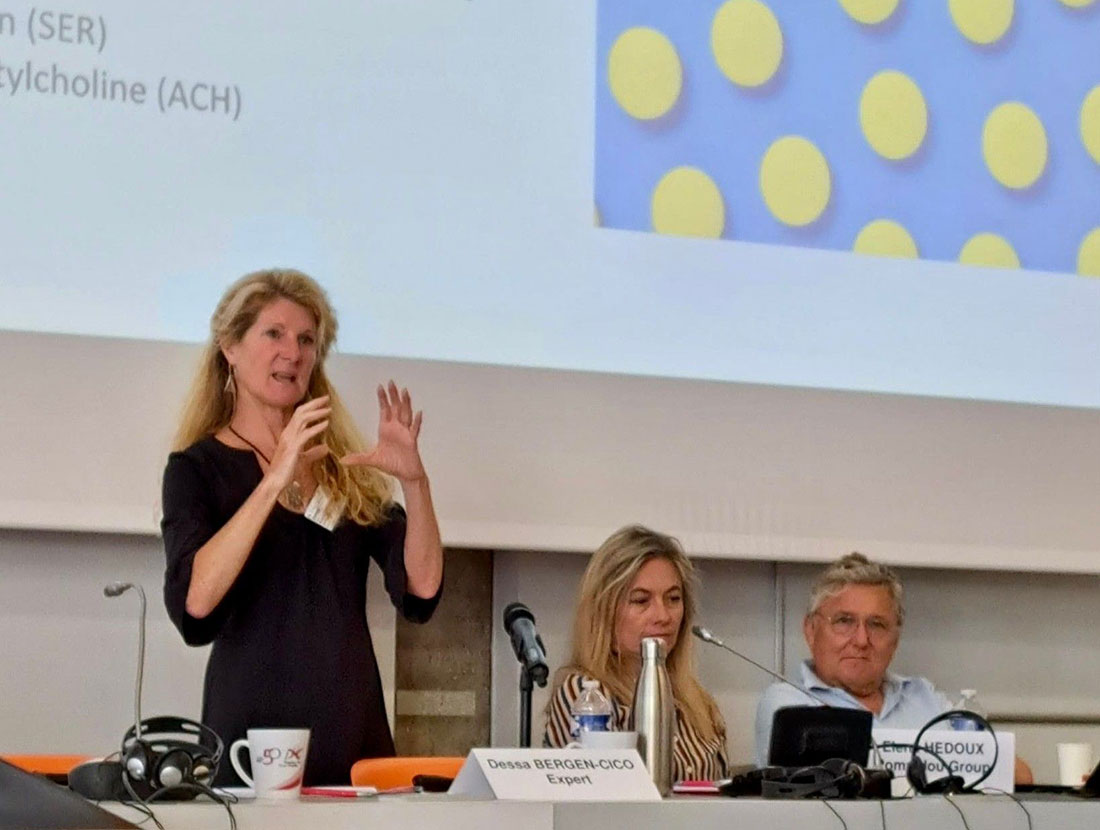
Dessa Bergen-Cico, professor and graduate director in the Department of Public Health, has been selected as the Falk College of Sport and Human Dynamics’ Honors Core Faculty member for a three-year term starting this May.
Renée Crown University Honors Program Core Faculty help shape the Honors Program curriculum and policy, and assist with strategic planning. Their academic vision and scholarly rigor guide the Honors Program in matters crucial both to the larger Honors faculty and to Honors students.
At Syracuse University, Bergen-Cico is coordinator of the Addiction Studies Programs, faculty in the Interdisciplinary Neuroscience Program, and a research affiliate for the Lerner Center for Public Health Promotion at the Maxwell School of Citizenship and Public Affairs. She was selected as Falk College’s Honors Core Faculty member by a four-person committee in consultation with Falk Dean Jeremy Jordan and Honors Program Director Danielle Taana Smith.
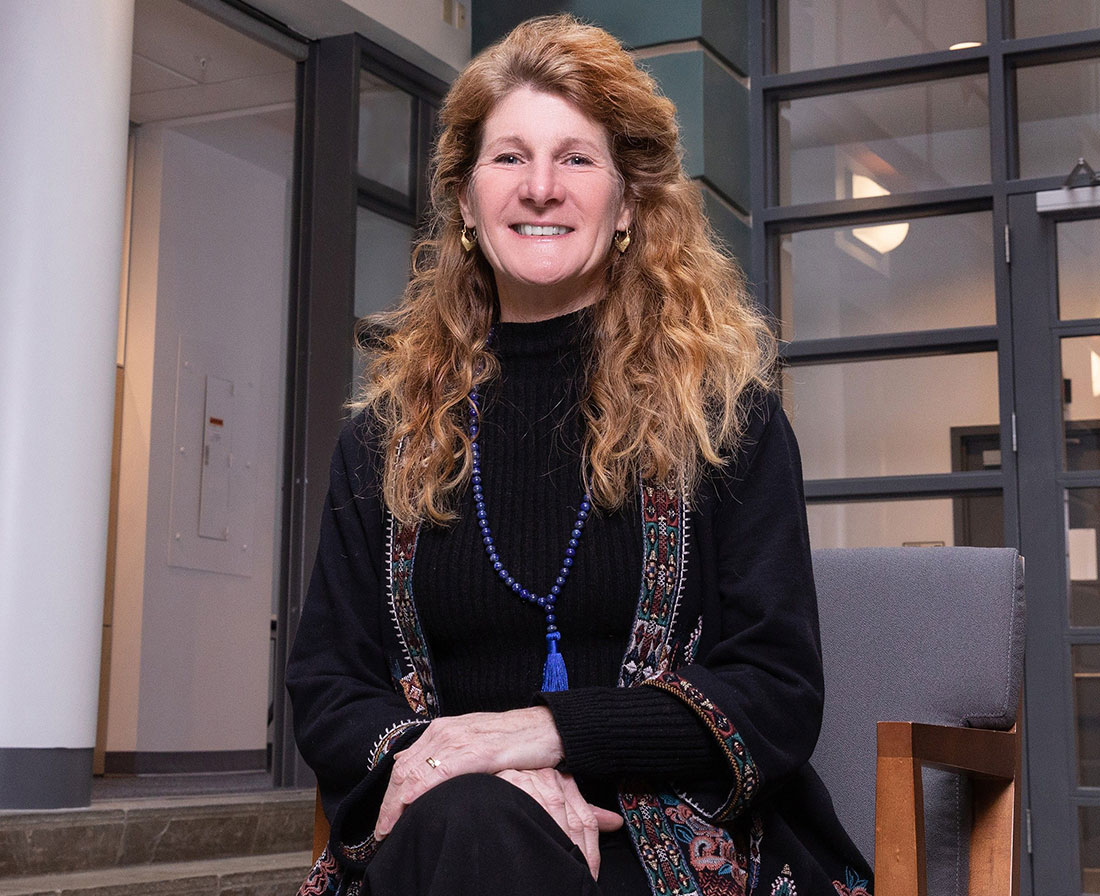
“Dessa’s credentials and passion for this opportunity were simply outstanding, and we are fortunate to have her represent us with the Honors program,” says Falk Associate Dean of Faculty Affairs Mary Graham, who was joined on the committee by Associate Dean of Academic Affairs Kay Bruening, Associate Dean of Research and Administration Katie McDonald, and Nutrition and Food Studies Associate Teaching Professor Chaya Charles.
“The Honors core faculty are so pleased to welcome Dr. Bergen-Cico to the group,” says Honors Program Director Smith, Professor of African American Studies in the College of Arts and Sciences at Syracuse. “The core faculty are high-impact teachers and researchers, at the forefront of their disciplines. They enhance the collegial experiences of students and are integral to the program.
“Dr. Bergen-Cico brings a background of undergraduate education excellence and academic leadership,” Smith adds. “We are excited to work with her to impact students, the campus, and our communities as a whole.”
Bergen-Cico holds a research appointment at the Syracuse Veterans Administration Medical Center and is a Fellow of the American Academy of Health Care Providers in the Addictive Disorders. She is a Certified Addiction Specialist (CAS), Certified Health Education Specialist (CHES), and Certified Mindfulness-Based Stress Reduction (MBSR) Teacher.
Bergen-Cico completed her MBSR teacher training through the Center for Mindfulness in Medicine, Health Care, and Society at the University of Massachusetts Medical School. She has been selected for two Fulbright Scholarships and was selected as a Rotary Peace Fellow in the International Rotary Peace Program at Chulalongkorn University in Thailand.
Bergen-Cico is currently leading a research team that’s exploring how to combine an artificial intelligence system with mindfulness-based practices to help people in treatment for opioid use disorder, and she co-developed the International Drug Policy Academy, which is one of several unique opportunities for students to obtain global experience that exposes them to new ways of thinking about substance abuse and addictive behaviors.
“As an Honors Faculty member, I would be able to teach students interdisciplinary and global perspective courses that encompass depth and breadth of content I am otherwise not afforded the opportunity to teach, at the level our top students need and want,” Bergen-Cico said in her letter of interest for the Honors Core position. “For example, it would afford opportunities to engage students in learning and research in applied neuroscience and cross-cultural biomarkers across diverse fields of study integrating sociology, psychology, and neurobiology in the study of addictive behaviors, stress, trauma, and conflict.”
Bergen-Cico is replacing Rick Burton, David B. Falk Endowed Professor of Sport Management, as Falk College’s Honors Core Faculty member.
“I and my colleagues in the Dean’s Office would like to thank Professor Burton for serving so capably for over 10 years as our Falk College designee to the Honors Program,” Graham says.
Three for One
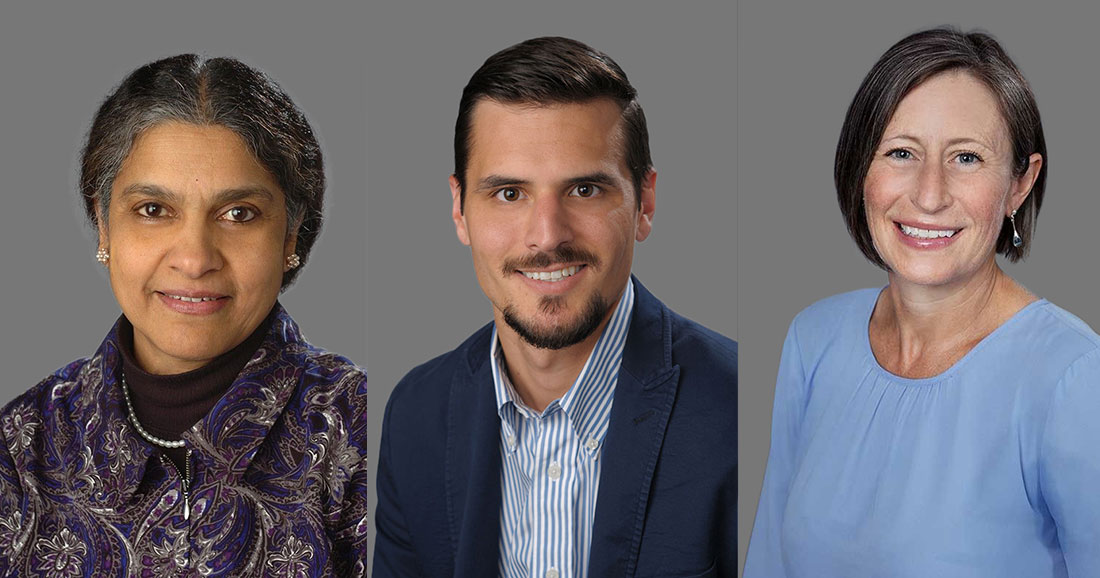
“Every year, we come together to celebrate the outstanding contributions and tremendous success of our students, faculty, staff and broader community,” says Chancellor Kent Syverud. “The accomplishments of this year’s recipients reinforce what it means to be Orange. This ceremony also shines a bright spotlight on the work being done around campus, much of which happens behind the scenes. I thank the many members of our community who organized this event and look forward to recognizing this year’s winners.”
Two major awards—the Chancellor’s Medal and the Chancellor’s Citation for Excellence—will be bestowed. The ceremony will also include the presentation of the Student-Athlete Award, Judith Seinfeld Scholarship, Meredith Professorship for Teaching Excellence, Teaching Recognition Award, Diversity and Inclusion Award, William Pearson Tolley Medal for Distinguished Leadership in Lifelong Learning and Chancellor’s Forever Orange Award.
Emeriti faculty who retired in 2023 and employees who celebrated years of service milestones in 2023 will also be recognized. This year’s University Scholars, Senior Class and School and College Marshals, and Remembrance and Lockerbie Scholars will also be honored.
All members of the University community are invited and encouraged to attend. A reception will follow in the lobby of the Heroy Geology Laboratory.
American Sign Language (ASL) interpretation and Communication Access Realtime Translation (CART) will be provided at the ceremony. For questions about accessibility or to request accommodations, contact Gabe Coleman at gbcolma@syr.edu.
Award Recipients
The Chancellor’s Medal is the University’s highest honor and is awarded to individuals in honor of their trailblazing and extraordinary contributions to the University, to an academic body of knowledge or to society. This year’s recipient is Shiu-Kai Chin, Laura J. and L. Douglas Meredith Professor for Teaching Excellence and professor of electrical engineering and computer science in the College of Engineering and Computer Science.
The Chancellor’s Citation for Excellencerecognizes individuals who have made outstanding contributions in four overarching categories:
- The award for Excellence in Student Research recognizes students who have engaged in collaborative research that has the potential to make a deep and lasting impact on greater society. This year’s recipients are Jingjing Ji, a doctoral candidate in chemical engineering in the Department of Biomedical and Chemical Engineering in the College of Engineering and Computer Science (graduate), and Ashtha Singh, an international relations major in the Maxwell School of Citizenship and Public Affairs and citizenship and civic engagement major in the Maxwell School (undergraduate).
- The award for Outstanding Contributions to the Student Experience and University Initiatives acknowledges faculty and staff who, through their work, enhance the undergraduate experience for students or make invaluable contributions to supporting and advancing the University’s mission and goals. The recipients are Charisse L’Pree Corsbie-Massay, associate professor of communications in the S.I. Newhouse School of Public Communications (faculty); Maureen Casey, chief operating officer for the D’Aniello Institute for Veterans and Military Families (professional staff); Amy Schmidt, program coordinator of citizenship and civic engagement in the Maxwell School (professional staff) and Jolanta Niwelt, events coordinator at Lubin House (support staff).
- The Faculty Excellence and Scholarly Distinction award is intended for faculty members who are collaborators in work of intellectual richness that has the potential for future impact. The work of these nominees offers possibilities for collaboration within the University and outside in partnership with others. This year’s honorees are Wayne Franits, Distinguished Professor in the Department of Art and Music Histories in the College of Arts and Sciences, and Katherine McDonald, associate dean of research and professor of Public Health in the Falk College of Sport and Human Dynamics.
- Chancellor’s Citation for Excellence, Lifetime Achievement Award. This award honors those who have made extraordinary contributions toward advancing all four pillars of excellence over the arc of their careers while at Syracuse University and beyond. This year’s recipient is Shobha Bhatia, Laura J. and L. Douglas Meredith Professor for Teaching Excellence and professor of Civil and Environmental Engineering in the College of Engineering and Computer Science.
The other awards to be presented are:
- The Student-Athlete Award recognizes the top female and top male student athletes and are presented to the senior student-athletes with the highest cumulative grade point average over the course of their academic and athletic careers. This year’s recipients are Izabela Krakic, an international relations major in the Maxwell School of Citizenship and Public Affairs and College of Arts and Sciences and member of the women’s rowing team, and Julius Rauch, an entrepreneurship and emerging enterprises major in the Whitman School of Management and a member of the men’s soccer team.
- Seinfeld Scholarship: Each year Syracuse University honors the talents of outstanding faculty or students through an award made possible by Judith Greenberg Seinfeld ’56, a distinguished alumna and member of the University Board of Trustees. Awards are made to those who have been determined by their peers to have made outstanding contributions to the beauty of the world, to have added to human values and to ending human abuse anywhere in the world, and to have demonstrated passion for excellence, creativity and originality in academic or artistic fields. This year, the designation is bestowed upon a faculty member, Rebecca Ortiz, associate professor of advertising in the Newhouse School.
- The Laura J. and L. Douglas Meredith Professorships for Teaching Excellence were created in 1995 to recognize and reward outstanding teaching among faculty. The 2024-27 Meredith Professors are Joon Park, professor in the School of Information Studies, and Cora True-Frost, Bond, Schoeneck and King Distinguished Professor in the College of Law.
- In 2001, the Meredith Professorship Program was expanded to recognize teaching excellence by non-tenured faculty and adjunct and part-time instructors. Awards are given in two categories: Early Performance and Continuing Excellence. This year’s honorees in the Early Performance category are Kelly Leahy, assistant professor of television, radio and film in the Newhouse School; Farzana Rahman, associate teaching professor of electrical engineering and computer science in the College of Engineering and Computer Science; Milton Santiago, assistant professor of visual communications in the Newhouse School; Darwin Tsen, assistant teaching professor of Chinese and Chinese language in the College of Arts and Sciences; and Nina Wilson, assistant professor in the School of Architecture. The two honorees in the Continuing Excellence category are Kenneth Marfilius, assistant dean of online and distance education and associate teaching professor of social work in the Falk College, and Sudha Raj, teaching professor and graduate director of nutrition and food studies in the Falk College.
- The Diversity and Inclusion Award recognizes an individual who is integral in helping us achieve academic excellence at a university that is welcoming to all through our investments in a diverse, inclusive, accessible and equitable community. This year’s recipient is Suzette Meléndez, teaching professor in the College of Law and faculty fellow for the Office of Strategic Initiatives and the Office of Diversity and Inclusion.
- The William Pearson Tolley Medal for Distinguished Leadership in Lifelong Learning is based in the School of Education and honors national or international leadership in support of lifelong learning. This year’s recipient is Rhodia Thomas ’77, executive director of MidPenn Legal Services, adjunct professor of law at Dickinson University and an alumna of the School of Education.
- The Chancellor’s Forever Orange Award recognizes individual students, faculty or staff who—by virtue of extraordinary hard work, good values and commitment to excellence—have come to embody the best of Syracuse University. This year’s recipients are Colleen O’Connor Bench, associate vice president of parent engagement and student experience, and Ian McIntyre, head coach of the men’s soccer team.
Desire to Give Back
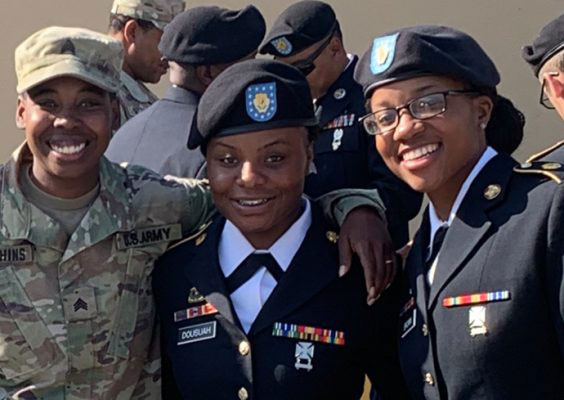
U.S. Army veteran Benetta Dousuah G’25, currently a graduate student in the Falk College of Sport and Human Dynamics, vividly recalls her family’s escape from Liberia during the back-to-back civil wars that ravaged the nation between 1989 and 2003. Initially seeking refuge in a camp in Ghana, it took almost a decade before they secured the opportunity to immigrate to the United States.
In reflecting on her resettlement experience, Dousuah expresses deep gratitude for the social workers who played a pivotal role in providing stability for her family, especially considering Liberia’s dire circumstances during the 2014 West Africa Ebola Virus outbreak, the worst in recorded history. In the remote villages scattered throughout West Africa, young women are often an indicator of viral outbreaks since they often serve as caretakers in their rural communities.
The enduring memories of U.S. Army soldiers providing humanitarian aid in her homeland influenced Dousuah’s decision to enlist in the military. While she was initially drawn by the educational benefits like the post-9/11 GI Bill, her desire to give back and assist those in need also significantly influenced her choice.
“After we came here from Liberia, I remember seeing soldiers helping out on the news. At the time it spoke to me, and I wanted to reciprocate that same energy, so I chose to enlist in the Army,” says Dousuah.
Dousuah served as a unit supply specialist, a crucial role in the logistical backbone supporting the U.S. military’s global presence. The military’s logistical units often play a vital role in humanitarian operations, particularly in remote areas with limited infrastructure.
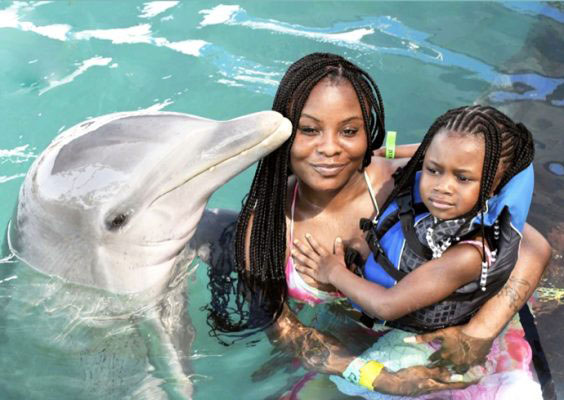
In 2014, the U.S. Army responded to the Ebola outbreak in Liberia by constructing specialty field hospitals and providing essential medical services throughout the region. By 2021, Dousuah, now a Sergeant in the U.S. Army and a mother to a young daughter, found herself offering the same kind of assistance to refugees that her family was shown when they fled Liberia
“We were deployed to Indiana to help with the Afghan refugee resettlement process,” says Dousuah, who identified parallels between her experiences coming to the U.S. and the Afghan families she assisted. In addition to her regular duties, she contributed to developing classes for children and volunteered as a teacher. This direct involvement inspired a long-term goal of establishing a school in Liberia.
“I plan on going back to Liberia after graduate school just to get the idea of what I need to do first, but ultimately I want to get the foundation going to try and build, and then open, a school there,” says Dousuah.
As an Army veteran, Dousuah is committed to supporting service members and veterans dealing with mental health challenges. Her motivation stems from personal experiences working with soldiers struggling to access adequate behavioral health services and recognizing the insufficient support for Black women in particular.
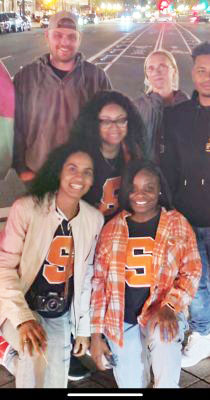
“Our mental health is not taken as seriously as it should be. If I’m experiencing social anxiety I may not be comfortable in the situation, but that’s not how people see it,” says Dousuah. “They just label us as angry, and it puts a lot of pressure on us when it comes to our mental health.”
According to the U.S. Department of Health and Human Services, women veterans aged 26 or older are among the most vulnerable members of the veteran population when it comes to suffering major depressive episodes. Dousuah sees her studies as a way to integrate both goals.
“While my concentration is on the clinical side of social work, I’ve also been able to take AIP (Advanced Integrated Practice) classes, which are more policy-related in a way,” says Dousuah. “My classes are helping me implement what I’m learning into the idea of building the school.”
Dousuah also seized an opportunity to assist her fellow veterans by interning with the College of Law at the Betty and Michael D. Wohl Veterans Legal Clinic.
“The work that I do in my internship is compelling because I get to help other veterans, particularly veterans like me or going through things I’ve been through. It’s helped me understand the whole holistic aspect of connecting veterans to resources, some of which I knew nothing about before,” says Dousuah.
To learn more about military-connected students at Syracuse University, or the programs and services available to them, please visit the Office of Veteran and Military Affairs website.
An SU News story by Charlie Poag originally published on Feb. 26, 2024.
Supporting Veterans
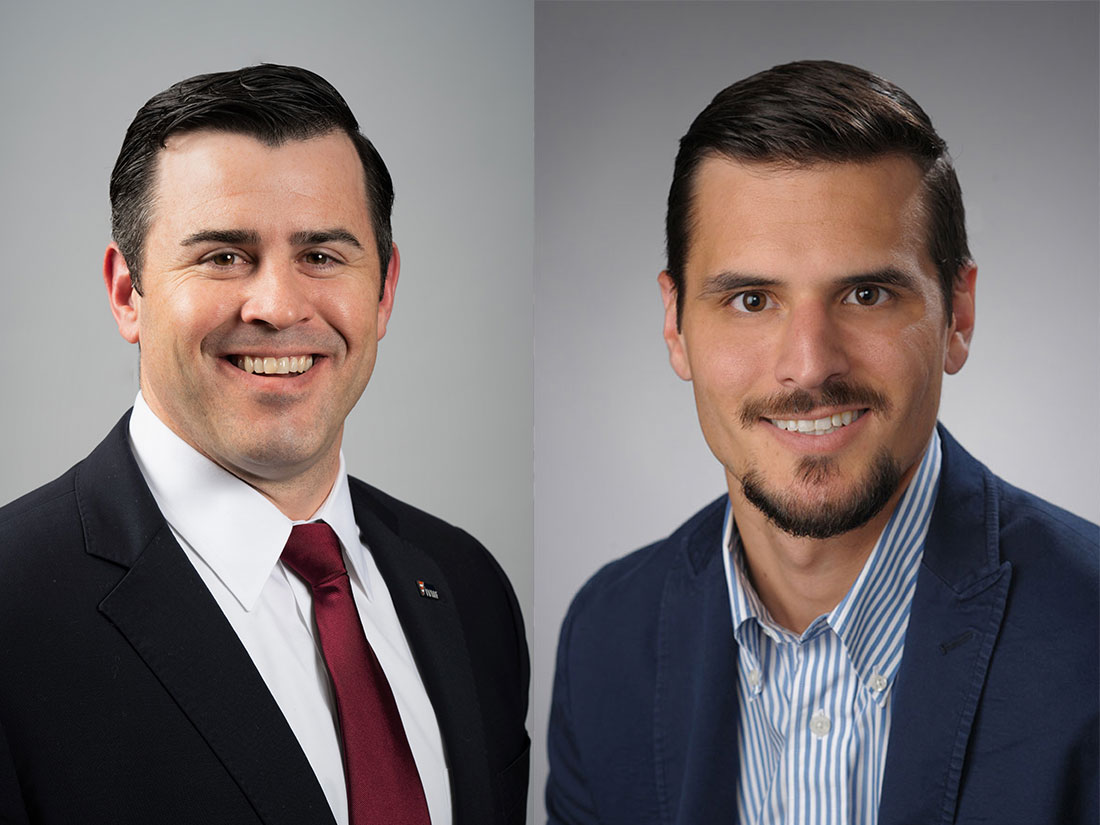
Ken Marfilius and Nick Armstrong are U.S. military veterans who have dedicated their lives to helping active military members, veterans, and their families.
Together, they have created a new and innovative partnership starting this spring that will greatly benefit veterans as well as students from the School of Social Work at Syracuse University’s Falk College of Sport and Human Dynamics.
Marfilius, a U.S. Air Force veteran and assistant dean of online education and associate teaching professor in the School of Social Work, and Amstrong, a U.S. Army veteran and head of public sector at Cabana, teamed with Cabana Co-Founder and CEO David Black to form a partnership that will integrate their immersive group support technology into the School of Social Work’s curriculum and tap into the combined strengths and capabilities of both organizations.
“Our collaboration with Ken and Falk leverages our immersive support technology platform, Cabana, and combines it with Syracuse University’s academic excellence and its nationally recognized commitment to veterans,” Armstrong says. “Our plan includes hands-on initiatives such as internships, collaborative education, and joint research. These efforts will bring our partnership to fruition and strengthen our shared commitment to serving military communities.”
As Syracuse University’s first Post 9/11 GI Bill recipient, Armstrong earned his M.P.A. and Ph.D. from the Maxwell School of Citizenship and Public Affairs. He spent nine years at Syracuse’s D’Aniello Institute for Veterans and Military Affairs before joining Cabana, which builds innovative technology solutions that provide guided mental health support for employers, healthcare workers, and military professionals.
Marfilius, who received his bachelor’s degree in psychology from Syracuse and his M.S.W. and D.S.W. degrees from the University of Pennsylvania, developed the first military mental health course at Falk College, serves as Falk’s student veteran liaison, and led the creation of the partnership between Falk and Syracuse University’s College of Law that helps help veterans access the legal services they need.
So, when Armstrong reached out to Marfilius to discuss ways in which they could partner around the services Cabana provides to military populations, Marfilius jumped right in and started working with Armstrong and Black on the framework for their collaboration.
“I believe the partnership between Cabana and Falk College is innovative in social work education and mental wellness,” Marfilius says. “It offers the ability to integrate real-world internships and cutting-edge tele-mental health training into our curriculum. We can prepare our graduate students for the future of social work, ensuring they are not only skilled but also technologically adept.” Marfilius and Armstrong discuss this partnership on Cabana’s “You’re Always fine” podcast in an episode called “Building bridges in mental health.”
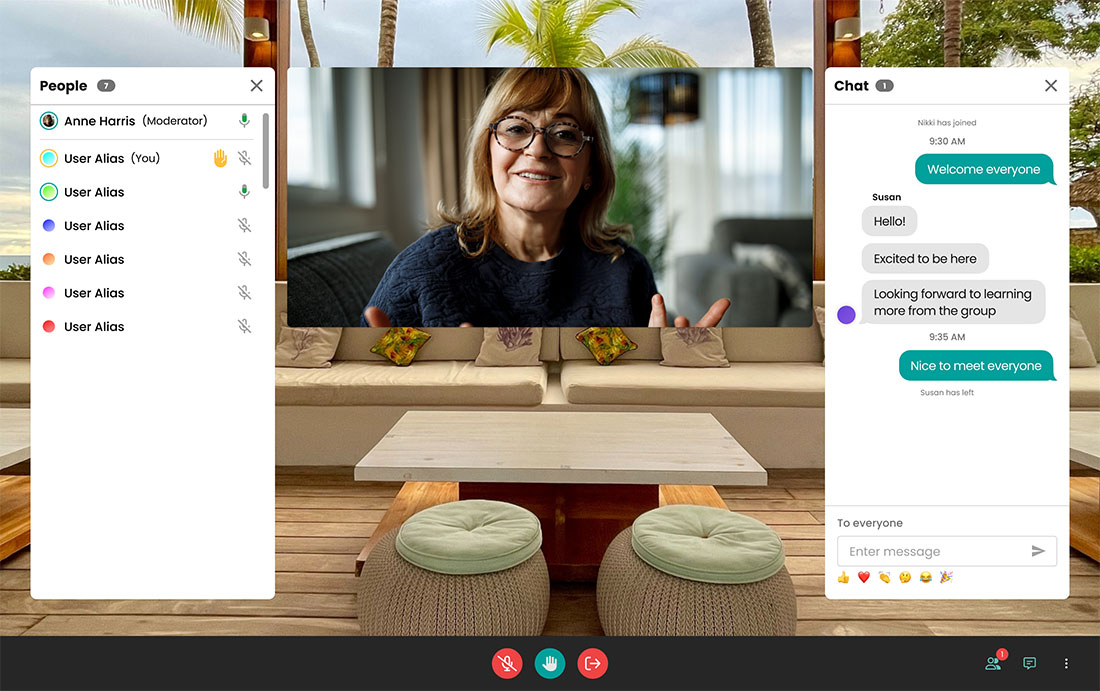
Here are the highlights of this unique partnership:
Cabana Internship.
Cabana will host one graduate student intern from the School of Social Work to support ongoing peer group support operations and psychoeducational content development. The intern will work under the supervision of Cabana’s head of mental wellness for a minimum of 500 hours.
Tele-Mental Health Training and Education Support.
Cabana will collaborate with Falk College faculty to embed its immersive group support technology into ongoing coursework and curricula to foster training and preparation of future social work professionals.
“The tele-behavioral health landscape is evolving rapidly, demanding practitioner and client adaptability to virtual environments,” Armstrong says. “Our partnership infuses Falk’s curriculum with leading-edge tools via Cabana’s underlying technology platform, better preparing students for client engagements through digital platforms.
“Moreover, Falk students, equipped with an advanced tier of military cultural competence, will enhance our clients’ experiences–and their future clients–with more relatable, informed support that builds trust and overcomes stigma,” Armstrong adds.
Military and Veteran Virtual Peer Groups.
Cabana will work with Falk faculty and its alumni network to assist ongoing virtual peer support groups for military and veterans starting this spring.
“This collaboration aligns with the Syracuse University mission to be the best place for vets, and it uniquely positions us to offer specialized support to our military and veteran communities,” Marfilius says. “Through virtual peer support groups and the development of tailored psychoeducational content, we are providing them with the essential mental health support they deserve.”
Military and Veteran Psychoeducational Content Development.
Cabana will work with Falk College faculty to review and evaluate Cabana content as a third-party reviewer.
“Engaging with industry partners allows us to bring practical, real-world experiences into our academic environment,” Marfilius says. “This partnership brings vast possibilities for research collaborations and advancement in peer interventions and group psychoeducation.”
CEU/Education Credits.
Falk College faculty will provide feedback, evaluate, and where appropriate, certify Cabana groups and content to satisfy New York State CEU (continuing education unit) requirements for wellbeing hours.
Research Collaborations.
As opportunities arise for Cabana and Falk College, the two entities agree to evaluate research collaborations and grant opportunities surrounding peer interventions, group psychoeducation, and other forms of mental health support.
“This collaboration aims to address the critical national shortage of mental health professionals, leveraging technology to extend reach and overcome barriers to access, especially for underserved populations,” Armstrong says. “It’s not just about serving more; it’s about serving smarter and cultivating a workforce ready for the challenges of today’s and tomorrow’s mental health landscape.”
Social Work students interested in getting involved in this partnership should email Marfilius at kjmarfil@syr.edu, or School of Social Work Director of Field Education Tracy Walker at ttwalker@syr.edu. Graduate students interested in the internship will go through an interview process with the School of Social Work and Cabana, and the intern will receive a modest stipend.
Serving Country and Campus
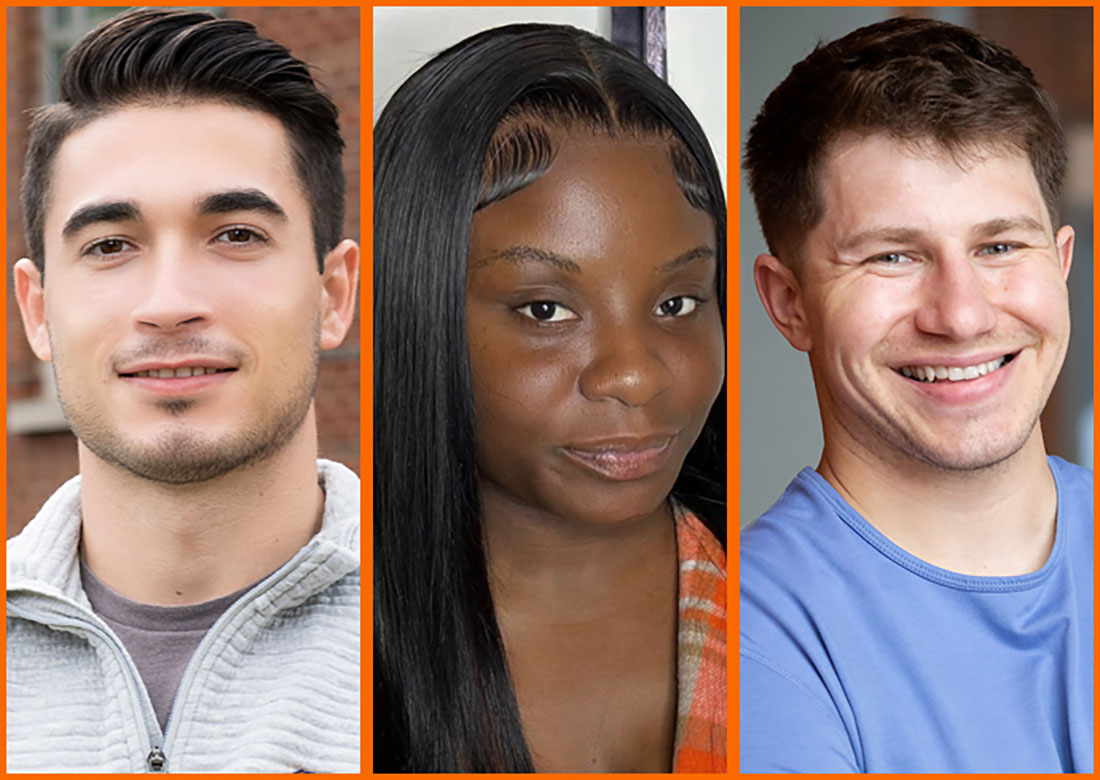
Veterans Day is a time for the Syracuse University community to come together and honor our veterans and active-duty military members for their service to their country.
Leading up to Veterans Day, three current student veterans who are active leaders on campus—Jack Pullano ’24, Benetta Dousuah G’25 and Raphael Grollmus ’24—reflect on their military careers, discuss the valuable lessons they learned through enlisting and share how the University is helping them achieve their academic goals and providing a blueprint for giving back to their communities.
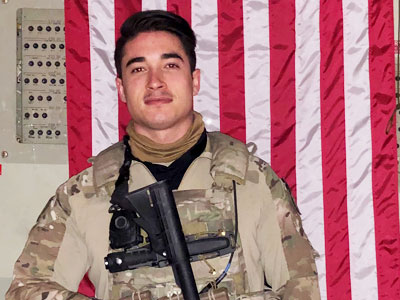
Jack Pullano ’24
After earning his high school degree from Parishville-Hopkinton High School in Parishville, New York, Pullano couldn’t wait to enlist in the U.S. Air Force. He was so eager to serve his country that he took the first assignment he could: as a refueling journeyman for planes and helicopters.
“My dad told me I should wait it out and not do this contract because he didn’t think I would like the work, but I was a young, stubborn 18-year-old who didn’t want to listen to him,” says Pullano, a health and exercise science major in the Falk College of Sport and Human Dynamics who is involved in the Syracuse University Student Veteran Organization. “Things played out in my favor. I didn’t enjoy refueling, but I was lucky to be on an Air Force Special Operations Command Base where there was a special fuel duty called the Special Operations Forward Area Refueling Point Team [FARP] that supports special operations command in combat locations. The tryout I had to go through for FARP was intense, and that experience started me down the path that led to Syracuse University,”
Branch of the military: U.S. Air Force, serving on the Kadena Air Base in Okinawa, Japan, helping fuel different kinds of aircraft. In his third year, Pullano was deployed to Afghanistan as part of a three-man FARP team. He served four years in the Air Force.
Why serve? “Because of my parents, Jim and Kelly. My dad joined the Air Force when he was young like me, doing one enlistment and then pursuing his education. My parents were always involved in my community growing up, especially with the sports I played. Seeing that community involvement probably instilled in me the service aspect that drives me today.”
Why Syracuse? “It was my personal interest in the human body from the intense physical tryout to get on the FARP team. I became interested not only in working out, but in what was causing changes to my body. I was learning about the human body by watching YouTube videos on how different muscles work. When I was looking at colleges, I wanted to pursue something I was interested in, and exercise science stood out to me. Syracuse has a strong program.”
How do you want to make a difference when you graduate? “Part of why I joined the military was the service aspect. Service was a goal of mine since I was young. When I got out of the Air Force, I wanted to continue to serve in ways that could be impactful to the community. Physical therapy drew my attention because of my past experiences and my drive to work one-on-one with patients trying to overcome an obstacle in their life. I’m currently interning at the VA [Veterans Affairs] Medical Center and that really opened my mind that I could not only continue with service that impacts people, but I could do it in the VA system, helping veterans with physical therapy.”
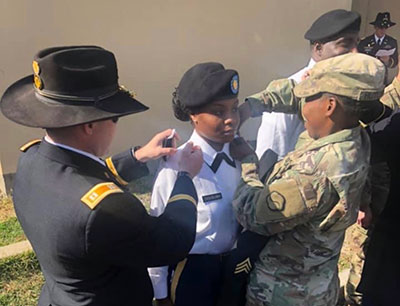
Benetta Dousuah G’25
When Dousuah was in the U.S. Army, she says soldiers dealing with mental health issues didn’t discuss their struggles openly, instead choosing to bottle up their emotions and their issues. Seeing the stigmas associated with mental health inspired Dousuah to pursue a master of social work degree from the Falk College.
“I want to be that person who lets you know that it’s okay to seek help if you’re struggling. I want to be that voice that says there shouldn’t be a stigma among military members who want to seek behavioral health and mental health help,” Dousuah says. “While I was in the service, a lot of people told me they were scared to seek help because they wouldn’t be promoted or they would be judged. I started going to behavioral health to let the soldiers know that it’s okay to admit you need help while bringing awareness to mental health,”
Branch of the military: Served as a sergeant in the U.S. Army. Stationed at both Fort Hood (now Fort Cavazos in Texas) and Fort Drum (Watertown, New York), Dousuah was involved in supply logistics, ensuring her company had everything they needed, from arranging broken equipment repairs to ordering supplies.
Why serve? “When I was younger, my mother used to remind me that I wanted to be a police officer. I don’t know why; all I know is from an early age I wanted to serve. The military allows you to go to college for free after your service is over, and that really appealed to me. I’ve always known I wanted to earn a college degree and be part of something bigger than myself.”
Why Syracuse? “I wanted to be somewhere where I could not only feel at home, but still feel like I’m connected to the military family. I chose Syracuse because of its reputation as a military-friendly school, but also because of the pride people take in going to Syracuse. It’s like being in the Army. When you meet someone who was in the Army, we’re proud of our service and will usually say, ‘Go Army.’ The same is true for someone who attended Syracuse. They always say, ‘Go Orange,’ and I’m blessed to be part of that community. I’ve been introduced to so many resources available to veterans.”
How do you want to make a difference when you graduate? “Right now, I’m the first Wendy Goidel Scholar, and through my work at the Betty and Michael D. Wohl Veterans Law Clinic, I connect our veterans to the available resources within the community. I have a passion for working with veterans, and this scholarship has been a great fit. When I graduate, I want to work at the VA Medical Center here in Syracuse, but I also want to work with at-risk African American youths. I feel like my story could be every young Black girl’s dream—coming from nothing, serving my country in the military and then earning a master’s degree. I could be an inspiration to others who want to follow my path.”
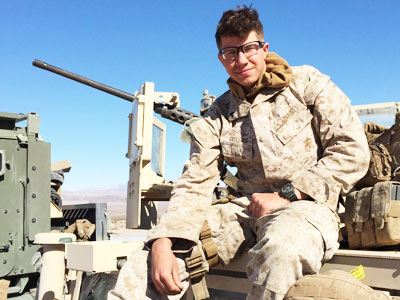
Raphael Grollmus ’24
Grollmus didn’t need to look far in his family tree to understand why military service was important. Grollmus became the sixth member of his family to enroll when he joined the U.S. Marine Corps in 2012. While he enjoyed his time, Grollmus always knew he wanted to utilize the Post-9/11 G.I. Bill to earn a college degree. Today, Grollmus is working toward a bachelor’s degree with a double major in forensic science and psychology in the College of Arts and Sciences.
“The time I served better prepared me for not only going to Syracuse, but life in general. I learned to think critically and to assess a situation before reacting,” Grollmus says. “For the student veterans at Syracuse, there are so many tools and resources available to us. Many veterans I talk with didn’t know all of the resources they had when they went back to school, but that’s where Syracuse has excelled. They take care of their veterans.”
Branch of the military: Served in the U.S. Marine Corps for nine years as a military policeman at the Marine Corps Air Station at Iwakuni, Japan, and at Camp Pendleton (Oceanside, California). Later, Grollmus assisted in combat operations as a forensic analyst stationed in the Middle East in Kuwait, Jordan, Bahrain and Iraq. After reenlisting, Grollmus finished his Marine security guard training and was stationed at the U.S. Embassy in Bamako, Mali, and the U.S. Consulate General in Ho Chi Minh City, Vietnam.
Why serve? “My mother, brother and sister were all in the Army. My grandfather on my mom’s side, Hank, fought in World War II, while my grandfather on my dad’s side, Paul, fought in the Korean War, so I grew up knowing the importance of service. After I graduated from high school, I enlisted in the Marines’ delayed entry program and ended up serving nine years. It goes back to my time as a military policeman. I want to protect people from the bad things that could happen to them. I also want to give back to people who have been wronged or been taken advantage of. I can’t go back in time and right the wrongs, but moving forward I can help give back to them.”
Why Syracuse? “When we were in the Middle East, we did forensics work and I was lucky enough to go to a monthlong forensic bootcamp. When transitioning out of the Marines, I wanted to study something I actually enjoyed. What we did in the Middle East was probably the most influential work from my military career and I was proud of what I was able to contribute. I wanted to keep doing forensic science and Syracuse has a great forensic science program. All the classes I’ve taken have been fantastic.”
How do you want to make a difference when you graduate? “My dream job would be working for one of those three-letter agencies [i.e., the Federal Bureau of Investigation]. That’s shooting for the stars, but I’d love to enter government service. But right now I’m taking a forensic pathology course that is fascinating and I genuinely love it. Crime scene investigation is a really interesting career path to consider.”
An SU story by John Boccacino previously published on November 9, 2023.
Page 1 of 5
